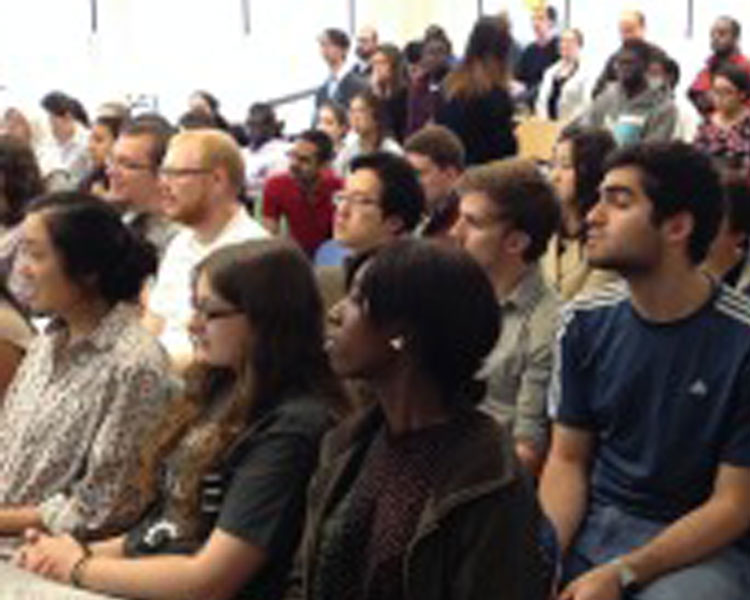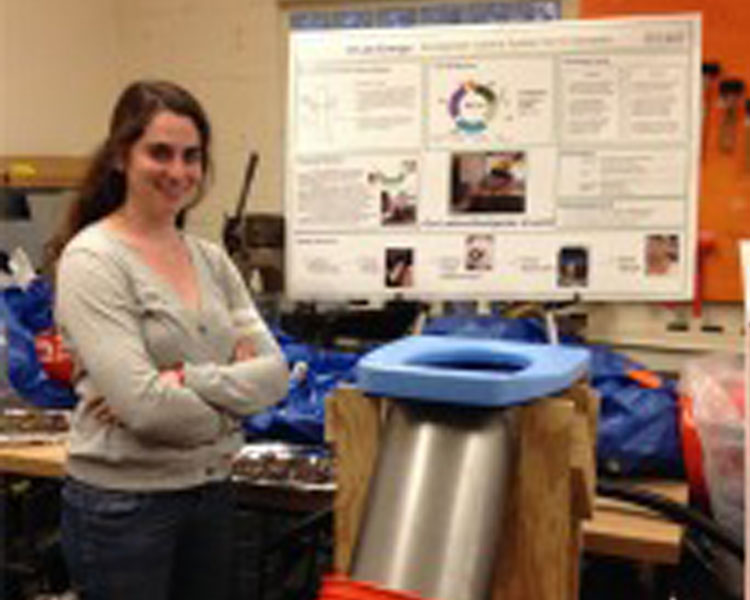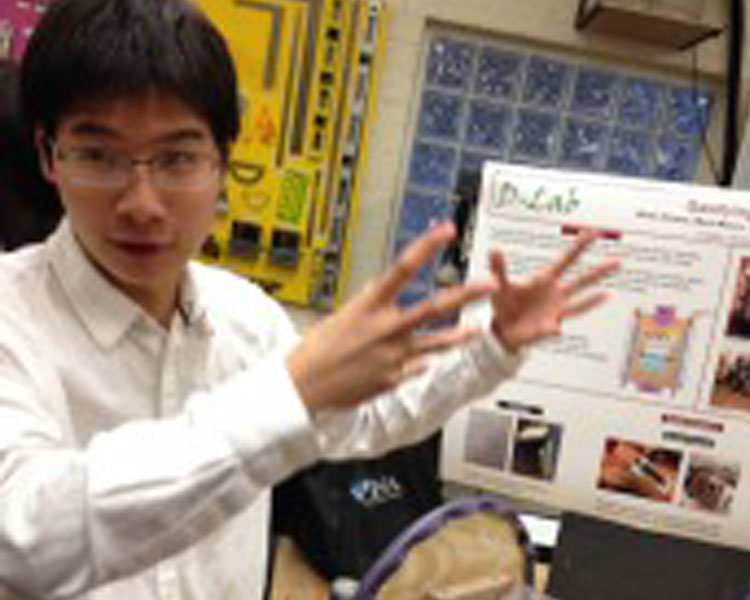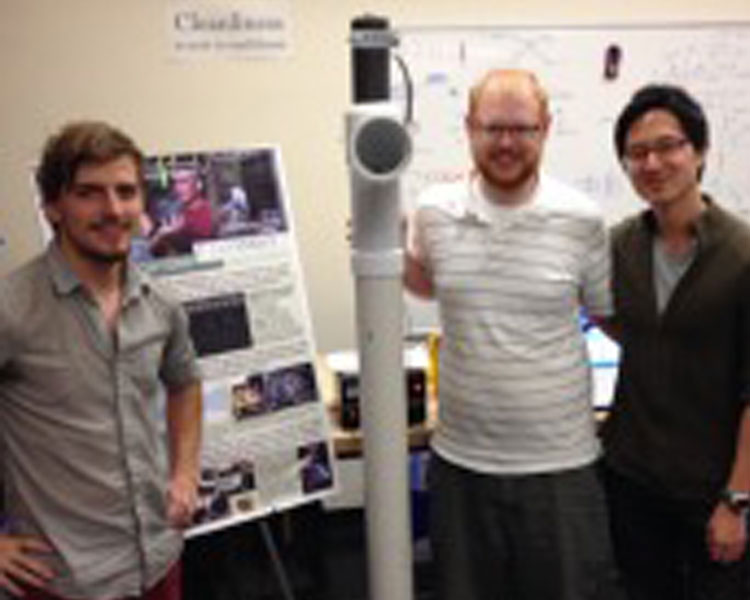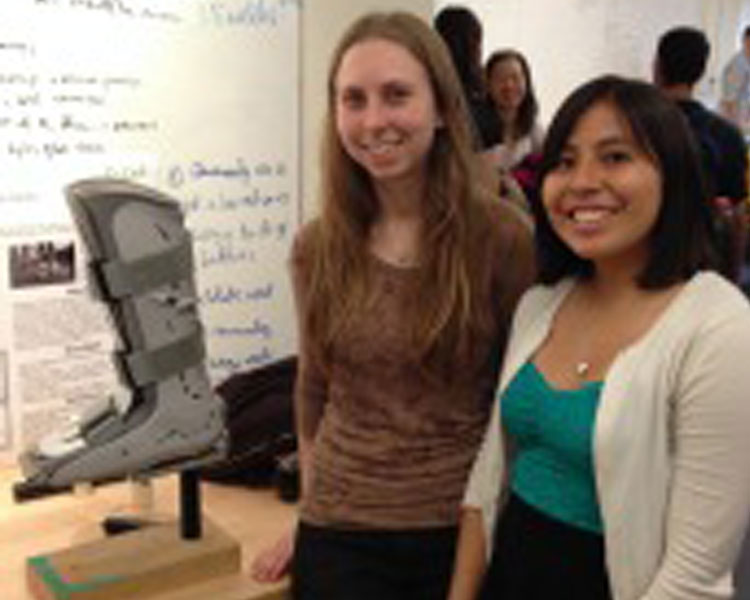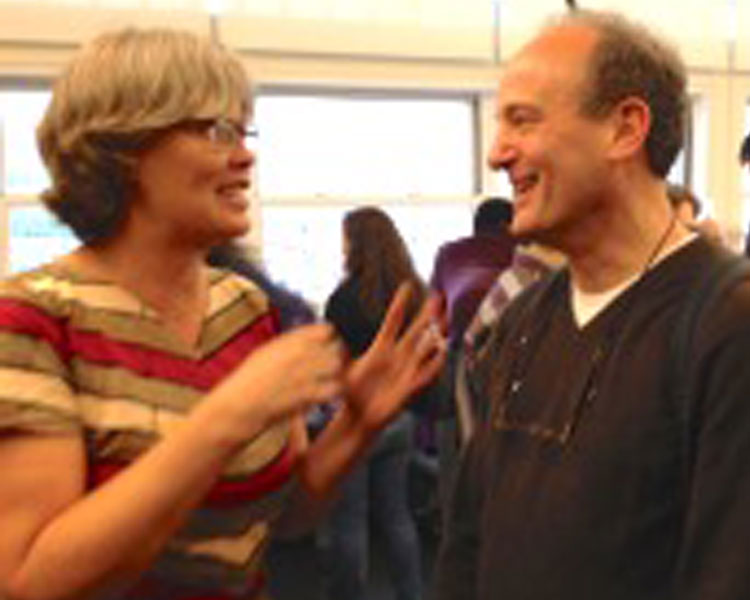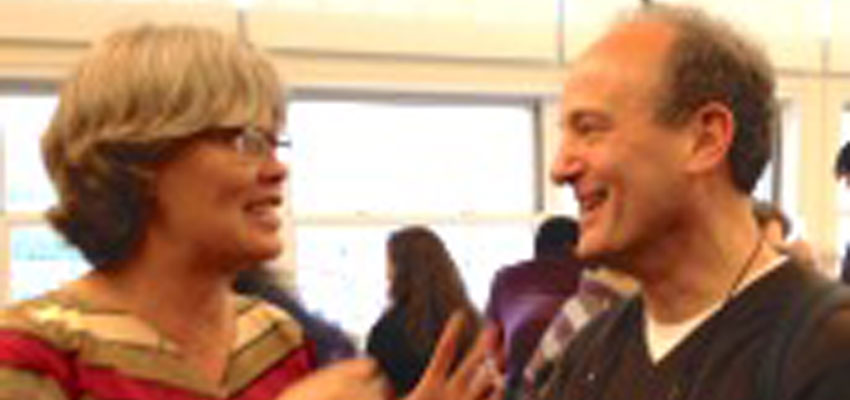
D-Lab is often best known for its cournerstone course, D-Lab Development, taught for over a decade by D-Lab founder, Amy Smith, and Bish Sanyal, Professor of Urban Development and Planning. In fact, ask an MIT student if they have experience with D-Lab and you often get the answer, "Yeah, I took D-Lab."
What seems to be less widely known is that after 12 years, D-Lab has developed a couple of additional courses, 19 courses in total, to be exact. Though not every course is taught every year, about a dozen different courses are.
Student projects from five of those courses were presented on May 9 at the 2014 D-Lab Spring Student Showcase. It was standing room only in D-Lab's "hands-on" classroom on the third floor of E-51 with over 150 in attendance to hear about projects from five D-Lab classes, an independent study, and our current group of D-Lab Biomass Fuel undergraduate researchers.
To kick things off, students gave brief slide presentations, following which, attendees were able to view all the working prototypes on display throughout the D-Lab space and talk to the students.
Following is a list of projects:
D-Lab: Design. Instructors — Rick Schuhmann + Aron Zingman
- SODIS in a Box. Developing a solar water disinfection system suitable for providing clean drinking water for a family of five living in a refugee camp in Uganda.
- Recoplastic Washer Dryer. A system for cleaning plastic waste collected by waste pickers in Nigeria before being recycled.
- Off Grid Blower for Gasifying Cookstove. A system for eliminating dependence on grid electricity for a gasifying cookstove blower in Zambia.
- Mud Brick Mold. Improved multiple mud brick manufacturing mold for use in Uganda, using only available and affordable materials.
D-Lab: Dissemination WASH. Instructor — Susan Murcott
- Ways2Clean. Redesigning the waste management system for Dinajpur, Banglasesh with workshops, sorting in collection vehicles, and streaming of recyclables.
- Bamboo Charcoal Water Filter. Developing the use of an activated bamboo charcoal layer on top of a bio-sand water filter to remove heavy metals and organic waste from polluted river water in Banjaran, Indonesia.
- Kom Zibu. An irrigation system that collects and distributes water to support reforestation efforts in Gburma, Northern Ghana.
- MyH2O. One of the first crowd-sourcing mapping platforms on water quality in China, designed to prompt water risk awareness, citizen activism and governmental responses through computer-based as well as mobile app platforms.
- WaSH4India. Scaling sanitation interventions in India. Summer pilot to make one village open-defecation free (ODF). Post-summer creation of website to inspire and train volunteers to reach 600 million Indians.
D-Lab: Education. Instructors — Jessica Huang + Pedro Cuéllar + Heather Beem
- Science in Action. A sustainable education model incorporating hands-on activities into science lessons using local resources at the senior secondary school in New Longoro, Ghana.
- Sustainable Schools Project. Working with FATEM to develop a model whereby economic activities help build cohesion and sustain community schools in isolated rural areas in Haiti.
- Community School Support. Collaborating on trans-generational finance workshops and hands-on engineering education at a community school in Northern Colombia.
- Interactive Entrepreneurship Workshops. Working with OneHen to empower youth to become social entrepreneurs at the Kasiisi Project’s network of 14 government primary schools in Western Uganda.
D-Lab: Biodiversity. Advisor — Ariel Phillips
- Plastic Pollution, Fish, and Surveying the impacts of plastic marine debris on fish and fishing communities Public Health in the Caribbean.
D-Lab: Energy. Instructors — Libby Hsu + Amit Ghandi
- Biodigester Latrine System. A modified urine-diversion latrine that can be connected to a biodigester for the conversion of human waste into energy.
- Acai Pits. Gasification of acai berry pits, currently a waste product in the Amazon, for their use as a fuel source.
- Hydropower Station. Conversion of a dammed area in a river to a hydropower station that can substitute for the use of diesel generators in an Amazon community.
D-Lab: Prosthetics. Instructors — David Sengeh + David Hill + Bryan Ranger + Katy Olesnavage + Katerina Mantzavinou
- Shock Absorbing Pylon. A module that interfaces with existing pylons used in developing countries to lower ground reaction forces on the prosthetic side and thus increase user comfort.
- Silicone Sleeve & Buckle Pin. A new suspension system for lower-limb prostheses, similar to what is currently used in the western world but for a fraction of the cost.
- 2D to 3D Modeling for Prosthetic Socket Manufacturing. A process to go from 2D images taken with a cell phone camera to a 3D model from which a socket can be built.
D-Lab Biomass Fuel UROPs. Supervisor — Dan Sweeney
Technical evaluation of traditional and improved cooking fuels and stoves in Uganda
McCall Huston is creating a data analysis tool and compiling data from field experiments performed in Uganda during IAP to quantify the benefits and impacts of using waste-derived fuels and improved cook stoves.
Instrumentation and data acquisition for laboratory cooking fuel evaluations
Harry Thaman has developed a LabView based system for measuring important efficiency and emissions indicators during fuel and cook stove evaluations in D-Lab’s Fuel Testing Facility.
Physical and chemical characterization of charcoal briquette fuels
Harry Thaman is using advanced analytical methods available at MIT to determine important material properties of carbonized agricultural residues used to make charcoal briquettes by local producers in East Africa.
Efficiency and emissions performance laboratory testing of carbonized briquette fuels
Isabella DiDio is performing laboratory evaluations of charcoal briquette fuels made by D-Lab partners in Uganda and Tanzania to understand benefits to users and the environment, and characteristics needing improvement.
Development of an improved small-scale charcoal kiln
Nani Ruiz and students in MIT Engineers Without Borders are evaluating efficiency and emissions performance of existing kiln technologies to understand how to improve upon them while maintaining low-cost and simple operation.
For more information on all D-Lab courses, see the D-Lab MIT Courses page. D-Lab's goal is to challenge talented students to use their math, science, engineering, social science, and business skills to tackle a broad range of global poverty issues.
